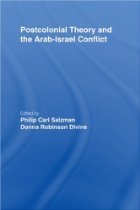MESH invites selected authors to offer original first-person statements on their new books-why and how they wrote them, and what impact they hope and expect to achieve. Philip Carl Salzman is professor of anthropology at McGill University and a member of MESH. His new book (with Donna Robinson Divine) is Postcolonial Theory and the Arab-Israel Conflict.

Kuhn’s argument appears to apply, to the extent it does, to natural science. It has nothing to do with the “social sciences” or self-proclaimed “humanities,” in which theoretical paradigms are largely unrelated to “data,” “information,” or “evidence.” Most “theory” in the “social sciences” and “humanities” is heuristic theory: vague, general guidelines and orientations which rarely are connected with substantive, middle-range theories capable of risky testing. These heuristic theories usually have a short lifespan in the social sciences and humanities. The rapid turnover of master theories are driven by two factors:
• Ideology. For example, in the 1970s, when no one in Eastern Europe believed in Marxism anymore, Marxism was adopted as a dominant paradigm in North American academia as graduates from the 1960s youth rebellions arrived in academic departments. Most every academic article began with quotes from Marx and Engels.
• Careerism. “Names” are made by advocating new paradigms and easy-to-remember slogans, not by the accumulation of evidence on a topic, which is too slow, detailed, and specialized to be of interest to the general membership of the discipline. Prestige and then status rest in saying something new and different, not in the careful accumulation of evidence, and never in supporting established paradigms.
The rise of Edward Said conformed closely to this pattern. His ideological stance was overdetermined, in that it drew heavily on Leninist ideas about imperialism and colonialism, and on Michel Foucault’s reduction of knowledge to power, on one hand, and a partisan advocacy in favor of the Muslim Middle East and particularly the Palestinians, on the hand. His foundational work, Orientalism, coined a slogan that today serves as an effective curse against ideologically “unacceptable” scholarship.
Although Said, a Columbia University professor of English literature, knew nothing of the “social sciences” and apparently not too much about oriental studies, his discrediting of Western scholarship of the East as a handmaiden of imperialism and a defamer of the “Other” rang true to his ideological kin in social sciences and humanities. I assumed at the time of its debut that such an ill-founded and transparently ethnocentric diatribe would not be taken seriously in academia. I could not have been more wrong. For the last decades Said has been probably the single most important influence in academic social science and humanities, taught in every other class in these “disciplines.”
Said’s prominence was assisted by the discrediting, among North American fair-weather academic friends, of Marx and Engels as a result of the fall of the Soviet Union, and the consequent inability of academic Marxists to so identify themselves. Said’s critique of “orientalism” spawned the son of Marxism and postmodernism, the elegantly named “postcolonial theory,” the main thesis of which is that all of the problems of the world are the result of Western imperialism and colonialism, and that all the problems of the Middle East are due entirely to Western imperialism and Israeli colonialism.
The multiple perniciousness of Said’s doctrine will perhaps continue until careerism of the next academic generation produces a fresh, new paradigm. The unlikeliness of serious criticism of postcolonial theory producing any modification of academic opinion did not, however, stop a number of us from addressing what we think are its weaknesses and distortions. Under the auspices of Scholars for Peace in the Middle East (full disclosure: I serve as a member of the Board of Directors) I organized a conference, held at Case Western University, on “Postcolonial Theory and the Middle East,” the proceedings of which have appeared under the title Postcolonial Theory and the Arab-Israel Conflict, first in fall 2007 as a special issue of Israel Affairs, and second in a hardback, Routledge volume, with the addition of a conclusion by myself, just out in spring 2008. Both versions were edited by myself and Donna Robinson Divine.
Following an introduction by Divine, four chapters by Irfan Khawaja, Ronald Niezen, Ed Morgan, and Laurie Zoloth, address theoretical issues, such as the doubtful philosophical basis of Said’s argument and its unsupportable assumptions. Two chapters by Herbert S. Lewis and Gerald M. Steinberg examine the pernicious effects of Saidism in anthropology and peace studies. Efraim Karsh, David Cook, and Andrew G. Bostom contribute chapters on Middle Eastern history that is unspoken in postcolonial discourse. Two chapters on Arab tribal and honor-shame culture are offered by myself and Richard Landes. Finally, addressing Said’s preferred example, Gideon Shimoni, S. Ilan Troen, Donna Robinson Divine, and Irwin Mansdorf analyze the Arab-Israel conflict, Zionism, the history of Palestine, and current ideological conceptions.
Does such criticism blunt the edge of postcolonialism? Does it undermine faith in the heuristic model? This seems doubtful. Consider other cases such as the evidence against the efficacy of socialism; yet people continue to say, even so, it is a good idea. Similarly, when the “hockey stick” diagram of temperature change was proven invalid, supporters of global warming replied, even so, the theory is correct. Shall Postcolonial Theory and the Arab-Israel Conflict lead to repudiation of Saidism? I doubt it. But perhaps it-along with Ibn Warraq’s Defending the West: A Critique of Edward Said’s Orientalism and Robert Irwin’s Dangerous Knowledge: Orientalism and Its Discontents -will at least give heart to skeptics and inform the open-minded.




